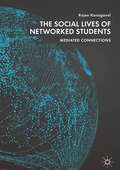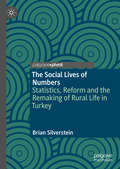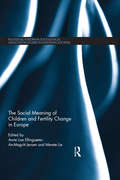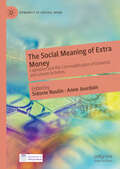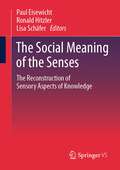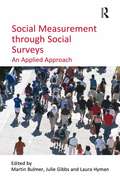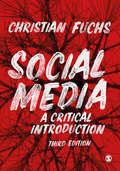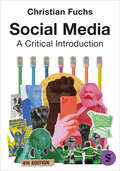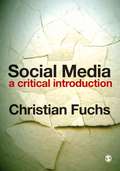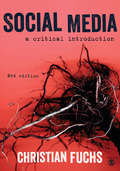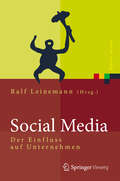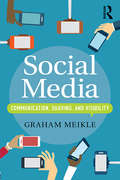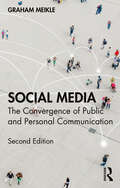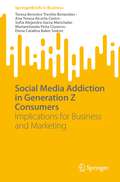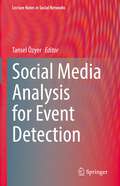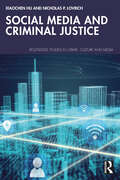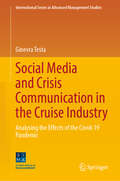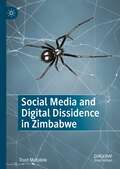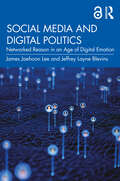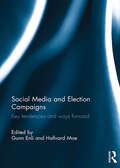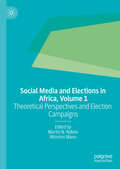- Table View
- List View
The Social Lives of Networked Students: Mediated Connections
by Rajee KanagavelThis book examines the social networks of international students, exploring the ways in which they experience social support and the role of the continuously evolving media landscape in their experiences of mobility. Drawing on survey data collected from over 250 respondents around the world, Rajee Kanagavel offers a social network analysis of transnational social formations to investigate the flow of social support through media channels, shedding light on how co-presence is no longer influenced by geographical distance. Kanagavel analyses the ways in which communication technologies are transforming the way we build and maintain relationships, and our ability to receive or give support across distance. As such, the book will be useful to scholars and students of sociology and media studies, particularly those with an interest in transnationalism, new media, social support and international student mobility.
The Social Lives of Numbers: Statistics, Reform and the Remaking of Rural Life in Turkey
by Brian SilversteinThis book examines the changing role of statistics in institutional reform in Turkey, and the unanticipated ways in which such changes transform livelihoods as well. Turkish agriculture is undergoing its most profound transformation since the establishment of the Republic in the 1920s. Seemingly minor technical adjustments in farmers’ reporting requirements and practices to collect better data on agriculture for statistics are also having a rapid and massive effect on farmers’ practices and livelihoods. The attempt to understand agriculture in Turkey in new ways is changing agriculture itself. The relationship between statistics and social and natural phenomena is thus performative, and such performativity undergirds a great deal of socio-technical change in the world. Drawing on fieldwork in Turkey with statisticians, farmers and agricultural extension technicians, the book shows how alongside deliberation about reforms, it is in and through this performativity that much of the work of institutional commensuration actually happens.
Social Manufacturing: Fundamentals and Applications (Springer Series in Advanced Manufacturing)
by Pingyu JiangThis book introduces social manufacturing, the next generation manufacturing paradigm that covers product life cycle activities that deal with Internet-based organizational and interactive mechanisms under the context of socio-technical systems in the fields of industrial and production engineering. Like its subject, the book's approach is multi-disciplinary, including manufacturing systems, operations management, computational social sciences and information systems applications. It reports on the latest research findings regarding the social manufacturing paradigm, the architecture, configuration and execution of social manufacturing systems and more. Further, it describes the individual technologies enabled by social manufacturing for each topic, supported by case studies. The technologies discussed include manufacturing resource minimalization and their socialized reorganizations, blockchain models in cybersecurity, computing and decision-making, social business relationships and organizational networks, open product design, social sensors and extended cyber-physical systems, and social factory and inter-connections. This book helps engineers and managers in industry to practice social manufacturing, as well as offering a systematic reference resource for researchers in manufacturing. Students also benefit from the detailed discussions of the latest research and technologies that will have been put into practice by the time they graduate.
The Social Meaning of Children and Fertility Change in Europe (Studies in European Sociology)
by Anne Lise Ellingsæter Merete Lie An-Magritt JensenLow fertility in Europe has given rise to the notion of a ‘fertility crisis’. This book shifts the attention from fertility decline to why people do have children, asking what children mean to them. It investigates what role children play in how young adults plan their lives, and why and how young adults make the choices they do. The book aims to expand our comprehension of the complex structures and cultures that influence reproductive choice, and explores three key aspects of fertility choices: the processes towards having (or not having) children, and how they are underpinned by negotiations and ambivalences how family policies, labour markets and personal relations interact in young adults’ fertility choices social differentiation in fertility choice: how fertility rationales and reasoning may differ among women and men, and across social classes Based on empirical studies from six nations – France, Scandinavia, Denmark, Norway, Sweden, Germany and Italy (representing the high and low end of European variation in fertility rates) – the book shows how different economic, political and cultural contexts interact in young adults' fertility rationales. It will be of interest to students and scholars of sociology, anthropology, demography and gender studies.
The Social Meaning of Extra Money: Capitalism and the Commodification of Domestic and Leisure Activities (Dynamics of Virtual Work)
by Sidonie Naulin Anne JourdainWhy do ordinary people who used to engage in domestic and leisure activities for free now try to make a profit from them? How and why do people commodify their free time? This book explores the marketization of blogging, cooking, craftwork, gardening, knitting, selling second-hand items, sexcamming, and more generally the economic use of free time. It outlines how the development of web platforms, the current economic context and post-Fordist values can account for this extension of market and labor.Drawing on a range of interviews, ethnographic observations, and quantitative surveys, the contributors question the empowering effects of commodification, with a specific focus on how gender and class inequalities affect the social meanings of extra money. Ultimately, the collective findings demonstrate how commodification pervades even the most mundane social activities. This research will be invaluable to scholars and students with a focus on gender and digital sociology, the sociology of work and labour, and the marketization of leisure.
The Social Meaning of the Senses: The Reconstruction of Sensory Aspects of Knowledge
by Paul Eisewicht Ronald Hitzler Lisa SchäferThat which we consider to be real we call knowledge. As a rule, we consider what our five senses convey to us to be real. Our perception and what we consider real and construct as socially effective differs depending on which senses we focus on and how intensively. The connection between reality constructions and sensory conditions has received little attention in social research so far. This concerns, for example, the use of our sensory organs for empirical reconstructions of bodies of knowledge, sensory perceptions as part of bodies of knowledge, or the question of how far knowledge is dependent on sensory abilities. This anthology attempts to close this gap by focusing on the social significance of sensory perceptions and discussing it using the example of various objects of investigation. This book is a translation of an original German edition. The translation was done with the help of artificial intelligence (machine translation by the service DeepL.com). A subsequent human revision was done primarily in terms of content, so that the book will read stylistically differently from a conventional translation.
Social Measurement through Social Surveys: An Applied Approach
by Julie GibbsHow do academic social scientists and survey professionals use social measurement techniques? How are these techniques applied to specific concepts in empirical research? This book is an important resource for students, academic and professional researchers, offering an overview of both new and practiced methods of social measurement for quantitative survey research. It will provide readers looking to investigate "hot" social science topics with a way of learning how key measurement techniques can be utilised in that topic in a practical way. Emerging from the editors' widely used work on an online social survey resource offering information on key social surveys and their questionnaires entitled ’Question Bank’, this book aims to take this material further. It elaborates on the problems involved with this resource type, providing a comprehensive and unique volume that will enable the reader to have the confidence to use this technique in their own research.
Social Media: A Critical Introduction
by Christian FuchsNever look at social media the same way again. Social media are an integral part of contemporary society. From news and politics to language and everyday life, they have changed the way we communicate, use information and understand the world. So we have to ask critical questions about social media. We have to dig deeper into issues of ownership, power, class and (in)justice. This book equips you with a critical understanding of the complexities and contradictions at the heart of social media’s relationship with society. The revised and expanded
Social Media: A Critical Introduction
by Christian FuchsNever look at social media the same way again. Social media are an integral part of contemporary society. From news and politics to language and everyday life, they have changed the way we communicate, use information and understand the world. So we have to ask critical questions about social media. We have to dig deeper into issues of ownership, power, class and (in)justice. This book equips you with a critical understanding of the complexities and contradictions at the heart of social media’s relationship with society. The revised and expanded
Social Media: A Critical Introduction
by Christian FuchsYou will never look at social media the same way again. Social media are an integral part of contemporary society. From news, warfare, politics, advertising, consumption, entertainment, friendships, labour, and economy to friendships, leisure, language, and everyday life, they have changed the way we communicate, use information and understand the world. Social media shape and are shaped by contemporary society. In order to understand contemporary society we have to ask critical questions about social media. This book is the ultimate guide for digging deeper into issues of ownership, power, class, and (in)justice. This book equips you with a critical understanding of the complexities and contradictions at the heart of social media’s relationship with society. The Fourth Edition contains new chapters and has updated and revised versions of other chapters: · The book includes a new chapter on TikTok in the context of global capitalism and the geopolitical conflict between China and the USA. · It explores new topics such as information and social media warfare in the context of Russia’s invasion of Ukraine, the implications of Elon Musk’s acquisition of Twitter for democracy and the public sphere, the prospects of Twitter-alternative Mastodon, digital fascism, influencers and the attention economy on TikTok, digital capitalism, the role of big data in digital capitalism, The Public Service Media and Public Service Internet Manifesto, social media’s digital alienation, and Putinism and information warfare. · It explores populism, racism, nationalism, militant patriarchy in a chapter on right-wing authoritarianism on social media that includes two case studies of Donald Trump and Putinism. · It analyses the phenomenon of social media influencers in the age of TikTok, Instagram, YouTube, and Snapchat. · It explains in an updated chapter what digital capitalism is and what role big data plays in it. · It explores the growing prominence of platforms and platform capitalism. · It analyses fake news, misinformation, and surveillance capitalism in the context of Facebook, WhatsApp, Cambridge Analytica, and the Internet Research Agency. · It shows why Google is simultaneously the Internet’s God and Satan. ·<span
Social Media: A Critical Introduction
by Christian FuchsYou will never look at social media the same way again. Social media are an integral part of contemporary society. From news, warfare, politics, advertising, consumption, entertainment, friendships, labour, and economy to friendships, leisure, language, and everyday life, they have changed the way we communicate, use information and understand the world. Social media shape and are shaped by contemporary society. In order to understand contemporary society we have to ask critical questions about social media. This book is the ultimate guide for digging deeper into issues of ownership, power, class, and (in)justice. This book equips you with a critical understanding of the complexities and contradictions at the heart of social media’s relationship with society. The Fourth Edition contains new chapters and has updated and revised versions of other chapters: · The book includes a new chapter on TikTok in the context of global capitalism and the geopolitical conflict between China and the USA. · It explores new topics such as information and social media warfare in the context of Russia’s invasion of Ukraine, the implications of Elon Musk’s acquisition of Twitter for democracy and the public sphere, the prospects of Twitter-alternative Mastodon, digital fascism, influencers and the attention economy on TikTok, digital capitalism, the role of big data in digital capitalism, The Public Service Media and Public Service Internet Manifesto, social media’s digital alienation, and Putinism and information warfare. · It explores populism, racism, nationalism, militant patriarchy in a chapter on right-wing authoritarianism on social media that includes two case studies of Donald Trump and Putinism. · It analyses the phenomenon of social media influencers in the age of TikTok, Instagram, YouTube, and Snapchat. · It explains in an updated chapter what digital capitalism is and what role big data plays in it. · It explores the growing prominence of platforms and platform capitalism. · It analyses fake news, misinformation, and surveillance capitalism in the context of Facebook, WhatsApp, Cambridge Analytica, and the Internet Research Agency. · It shows why Google is simultaneously the Internet’s God and Satan. ·<span
Social Media
by Christian FuchsNow more than ever, we need to understand social media - the good as well as the bad. We need critical knowledge that helps us to navigate the controversies and contradictions of this complex digital media landscape. Only then can we make informed judgements about what's happening in our media world, and why. Showing the reader how to ask the right kinds of questions about social media, Christian Fuchs takes us on a journey across social media, delving deep into case studies on Google, Facebook, Twitter, WikiLeaks and Wikipedia. The result lays bare the structures and power relations at the heart of our media landscape. This book is the essential, critical guide for all students of media studies and sociology. Readers will never look at social media the same way again.
Social Media: A Critical Introduction
by Dr Christian Fuchs"Timely new chapters on China and the 'sharing economy' of Uber and Airbnb strengthen an already vital contribution to communication studies. Through the lens of critical theory, Fuchs provides the essential text for students of our new media world." –Vincent Mosco, Queen's University, Ontario With social media changing how we use and understand everything from communication and the news to transport, more than ever it is essential to ask the right kinds of questions about the business and politics of social media. This book equips students with the critical thinking they need to understand the complexities and contradictions and make informed judgements. This Second Edition: Lays bare the structures and power relations at the heart of our media landscape Explores the sharing economy of Uber and Airbnb in a brand new chapter Takes us into the politics and economy of social media in China Puts forward powerful arguments for how to achieve a social media that serves the purposes of a just and fair world This book is the essential, critical guide for all students of media studies and sociology. Readers will never look at social media the same way again.
Social Media: A Critical Introduction
by Dr Christian Fuchs"Timely new chapters on China and the 'sharing economy' of Uber and Airbnb strengthen an already vital contribution to communication studies. Through the lens of critical theory, Fuchs provides the essential text for students of our new media world." –Vincent Mosco, Queen's University, Ontario With social media changing how we use and understand everything from communication and the news to transport, more than ever it is essential to ask the right kinds of questions about the business and politics of social media. This book equips students with the critical thinking they need to understand the complexities and contradictions and make informed judgements. This Second Edition: Lays bare the structures and power relations at the heart of our media landscape Explores the sharing economy of Uber and Airbnb in a brand new chapter Takes us into the politics and economy of social media in China Puts forward powerful arguments for how to achieve a social media that serves the purposes of a just and fair world This book is the essential, critical guide for all students of media studies and sociology. Readers will never look at social media the same way again.
Social Media
by Ralf LeinemannDie Beiträge aus unterschiedlichen Unternehmen bieten eine fundierte Darstellung zum Einfluss sozialer Medien (Facebook, Twitter, LinkedIn, Xing, etc) auf die Kommunikation und Aussendarstellung von Unternehmen sowie auf interne Prozesse. Die Autoren erläutern zunächst den Einfluss auf interne und externe Kommunikation, die Kommunikationsqualität in sozialen Medien und die Chancen und Risiken der neuen Medien. Die Einflüsse auf die verschiedenen Unternehmensbereiche werden aus der Praxis heraus diskutiert. Zu den adressierten Bereichen gehören die Auswirkungen auf PR und Analyst Relations sowie auf Kommunikation und IT-Infrastruktur. In zwei abschließenden Kapiteln werden auch einzelne Branchen beleuchtet und ein internationaler Vergleich vorgestellt.
Social Media: Communication, Sharing and Visibility
by Graham MeikleSocial media platforms have captured the attention and imagination of many millions of people, enabling their users to develop and display their creativity, to empathize with others, and to find connection, communication and communion. But they are also surveillance systems through which those users become complicit in their own commercial exploitation. In this accessible book, Graham Meikle explores the tensions between these two aspects of social media. From Facebook and Twitter to Reddit and YouTube, Meikle examines social media as industries and as central sites for understanding the cultural politics of everyday life. Building on the new forms of communication and citizenship brought about by these platforms, he analyzes the meanings of sharing and privacy, internet memes, remix cultures and citizen journalism. Throughout, Social Media engages with questions of visibility, performance, platforms and users, and demonstrates how networked digital media are adopted and adapted in an environment built around the convergence of personal and public communication.
Social Media: The Convergence of Public and Personal Communication
by Graham MeikleFrom Facebook and YouTube to TikTok and WeChat, this accessible book explores the relationships between public and personal communication on social media to understand their impacts on users’ everyday lives.Social media have made possible new kinds of relationships, entertainment, and politics, and enabled billions of people to experience new forms of communication, community, and communion. But social media are also profit-driven, data-mining corporations, and their core business model is often built around targeted surveillance that enables the commercial exploitation of their users’ everyday lives. Graham Meikle explores the tensions between these different dimensions of social media, engaging with questions of communication, data, remix, news, visibility, citizenship, and regulation. This second edition has been substantially revised: more than half of the text is entirely new to this edition, and those sections that remain have been completely updated. This new edition includes analysis of the data-driven business models of major social media firms, and of how these firms are expanding into new areas such as AI. It also includes discussion of major developments in news, surveillance, and activism on social media, as well as a new chapter on regulation.This book is an ideal critical introduction to social media in all their complexity.
Social Media Addiction in Generation Z Consumers: Implications for Business and Marketing (SpringerBriefs in Business)
by Teresa Berenice Treviño Benavides Ana Teresa Alcorta Castro Sofia Alejandra Garza Marichalar Mariamiranda Peña Cisneros Elena Catalina Baker SuárezSocial media has become vital in Generation Z users' daily lives, as they are the most connected group through social media; however, studies have shown the negative side of using social media heavily, particularly loneliness. Furthermore, the COVID-19 pandemic has contributed to the significant growth of social media use with Generation Z users, which has shown to cause negative psychological effects. This book explores the behaviors of Generation Z consumers on various social media platforms (including interaction with brands as well as persons) and, using results from a Bergen Social Media Addiction Scale (BSMAS) analysis, explores the potential risks and causes of social media addiction in this generation. In particular, it offers an integrative model to help marketers understand social media addition and ways in which companies and associations can promote a more conscious use of social media by acknowledging that pathological use of social media has negative effects. This book is useful for students, researchers, scholars interested in empirical research on consumer social media use and addiction.
Social Media Analysis for Event Detection (Lecture Notes in Social Networks)
by Tansel ÖzyerThis book includes chapters which discuss effective and efficient approaches in dealing with various aspects of social media analysis by using machine learning techniques from clustering to deep learning. A variety of theoretical aspects, application domains and case studies are covered to highlight how it is affordable to maximize the benefit of various applications from postings on social media platforms. Social media platforms have significantly influenced and reshaped various social aspects. They have set new means of communication and interaction between people, turning the whole world into a small village where people with internet connect can easily communicate without feeling any barriers. This has attracted the attention of researchers who have developed techniques and tools capable of studying various aspects of posts on social media platforms with main concentration on Twitter. This book addresses challenging applications in this dynamic domain where it is not possible to continue applying conventional techniques in studying social media postings. The content of this book helps the reader in developing own perspective about how to benefit from machine learning techniques in dealing with social media postings and how social media postings may directly influence various applications.
Social Media and Criminal Justice (Routledge Studies in Crime, Culture and Media)
by Nicholas P. Lovrich Xiaochen HuDiscussing social media-related scholarship found in criminology, legal studies, policing, courts, corrections, victimization, and crime prevention, this book presents the current state of our knowledge on the impact of social media and the major sociological frameworks employed to study the U.S. justice system.Building a theoretical framework for the study of social media and criminal justice in each chapter, the chapters provide a systematic reflection of extant research on social media in cybercrime, operations of courts, administration of institutional and community corrections, law enforcement, and crime prevention. The book fills the gap between the contemporary state of knowledge regarding social media and criminal justice with respect to both empirical evidence and types of sociological frameworks being employed to explore and identify the societal costs and benefits of our growing dependence upon social media. In addition to providing an up-to-date overview of our current state of knowledge, this book highlights important areas of future research, wherein the benefits of social media can be expanded and the negative aspects of its broadening use can be minimized.Social Media and Criminal Justice will be of interest to students, scholars and practitioners in the areas of judicial administration, corrections management, law enforcement, and criminal justice-engaged community-based nonprofit organizations involved in court-referred treatment and/or active collaboration with local law enforcement agencies.
Social Media and Crisis Communication in the Cruise Industry: Analysing the Effects of the Covid-19 Pandemic (International Series in Advanced Management Studies)
by Ginevra TestaThis academic monograph examines the crisis communication response strategies employed by the cruise industry on social media following the COVID-19 pandemic. Focusing on social media platform X, the author conducted a content analysis of the top three cruise lines' strategies using NVivo software and assessed public sentiment and emotions through comments using KNIME and R software. The findings identify the most effective strategies for generating positive public sentiment and favourable emotions, contributing to faster business recovery. The book enhances Situational Crisis Communication Theory and offers practical guidance for managers to improve crisis resilience in the face of crises of such magnitude and duration. This work uniquely combines corporate and consumer perspectives to assess the effectiveness of crisis communication.
Social Media and Digital Dissidence in Zimbabwe
by Trust MatsileleThis book proposes a new theorisation when studying cyber dissidents in an African digital sphere. It argues that social media dissidents are a recent development in a long lineage of dissidents in African societies. Using Zimbabwe as a case study, the study locates contemporary dissidents in the same family with other historical dissident figures found in African orature, the Chimurenga wars, through music, poetry and other forms of expression. The book argues against techno-deterministic approaches to studying social media-born digital dissidence in Africa. It is aimed at scholars dedicated to studying social media movements in African contexts and the global south generally, prompting them to re-evaluate their earlier conclusions and adopt a more nuanced and contextspecific approach.
Social Media and Digital Politics: Networked Reason in an Age of Digital Emotion
by James Jaehoon Lee Jeffrey Layne BlevinsInformed by critical theory, this book employs Social Network Analysis (SNA) to examine the ever-increasing impact that social media has on politics and contemporary civic discourse.In just the past decade, social media platforms have been at the forefront of political discord that played out in the January 6th insurrection, the expulsion of a US President from major social media platforms, the attempted regulation of social media in various states, and the takeover of Twitter (now “X”) by one of the richest and (arguably) most financially influential persons in the world. This book examines these phenomena through a comprehensive and in-depth exploration of their meaning and implication for democratic society. Informed by SNA, James Jaehoon Lee and Jeffrey Layne Blevins examine several types of social and political commentary on one of the most influential social media networks and argue that the use of emotional appeals in these posts about social and political topics degrades the quality of civic discourse and encourages the abandonment of reasoning in democratic self-governance.A timely and vital text for upper-level students and scholars in a variety of disciplines from media and communication studies, journalism, and digital humanities to social network analysis, political science, and sociology.The Open Access version of this book, available at http://www.taylorfrancis.com, has been made available under a Creative Commons Attribution-Non Commercial-No Derivatives (CC-BY-NC-ND) 4.0 license.
Social Media and Election Campaigns: Key Tendencies and Ways Forward
by Gunn Enli and Hallvard MoeThis book aims to further the research in the fields of social media and political communication by moving beyond the hype and avoiding the most eye-catching and spectacular cases. It looks at stable democracies without current political turmoil, small countries as well as large continents, and minor political parties as well as major ones. Investigating emerging practices in the United States, Europe, and Australia, both on national and local levels, enables us to grasp contemporary tendencies across different regions and countries.The book provides empirical insights into the diverse uses of different social media for political communication in different societies. Contributors look at the ways in which novel arenas connect with other channels for political communication, and how politicians as well as citizens in general use social media services. Presenting state-of-the-art methodological approaches, drawing on a combination of qualitative and quantitative analyses, the book brings together an interdisciplinary group of researchers in order to address emerging practices of the mediation of politics, campaign communication, and issues of citizenship and democracy as expressed on social media platforms.This book was originally published as a special issue of Information, Communication & Society.
Social Media and Elections in Africa, Volume 1: Theoretical Perspectives and Election Campaigns
by Martin N. Ndlela Winston ManoThis book brings together fresh evidence and new theoretical frameworks in a unique analysis of the increasing role of social media in political campaigns and electoral processes across Africa. Supported by contemporary and historical cases studies, it engages with the main drives behind the various appropriations of social media for election campaigns, organization, and voter mobilization. Contributors in this volume delve into changing and complex aspects of social media, offering an appraisal of theoretical perspectives and examining fascinating case studies which social media use is redefining elections across Africa. Contributions show that new media ecologies are resulting in new policy regimes, user behaviors, and communication models that have implications for electoral processes. The book also provides preliminary analysis of emerging forms of algorithm-driven campaigns, fake news, information distortions and other methods that undermine electoral democracy in Africa.
